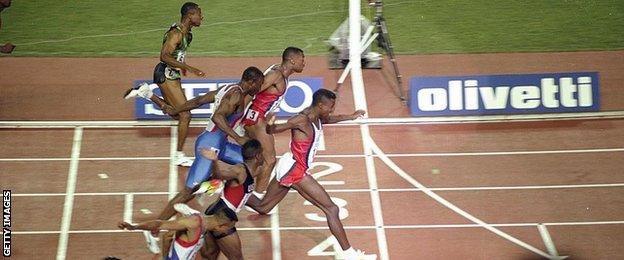Tokyo Olympics: Elaine Thompson-Herah last woman standing as epic boils down to duel
- Published
Tokyo Olympics: Thompson-Herah breaks Olympic record and defends 100m title
The same city, the same distance, but a different script.
Thirty years ago, Tokyo saw perhaps the greatest 100m race of all time.
Under the lights, in front of a capacity crowd, the globe stopped spinning for slightly less than 10 seconds as American great Carl Lewis won the world title in a world record time.

Carl Lewis wins the 1991 World Championships in a world record time of 9.86 seconds
Behind him, a tenth of a second covered a top six who hailed from three different continents. It was a finish-line crowd scene with a character for everyone.
A month ago, it seemed the women's race at this Tokyo Games might match it.
In one corner, the brash 21-year-old American newcomer Sha'Carri Richardson. In the other, the eternal golden oldie Shelly-Ann Fraser-Pryce.
The great British hope Dina Asher-Smith, the injury-ravaged defending champion Elaine Thompson-Herah, the wildcard 400m convert Shericka Jackson, the in-form Nigerian Blessing Okagbare.
A tangle of storylines and a blizzard of sub 11-second times.
Allow X content?
This article contains content provided by X. We ask for your permission before anything is loaded, as they may be using cookies and other technologies. You may want to read X’s cookie policy, external and privacy policy, external before accepting. To view this content choose ‘accept and continue’.
In the end, we got our drama. Just not the one we expected.
As Thompson-Herah lay on her back and her shrieks of delight rang around the empty Olympic Stadium stand, it was the final twist in a slimmed-down two-hander. The sprawling epic never emerged. It turned out personal, rather than global.
The cast list had begun to be whittled down long before the final destination of the finish line.
Richardson's threat was blunted a month ago by a positive test for cannabis. A day before the final, Okagbare was removed for failing a test for human-growth hormone. A couple of hours before, Asher-Smith revealed a hamstring problem had nobbled her chances.
And five seconds into the final, it was down to two.
Dina's tears, Olympic Records and awkward celebrations
Thompson-Herah's golden locks flying in her wake, Fraser-Pryce's tequila sunrise dye-job streaking through the humid air and clear daylight back to the rest of the field.
Gold hung in the balance. But only for a moment. Thompson-Herah's shoulders stayed loose and her stride stayed long. Fraser-Pryce's frame tensed and her chance of a third Olympic 100m title slipped over the horizon.
Fraser-Pryce's time of 10.74 would have won all but two previous Olympics finals, but it was never going to be enough in Tokyo.
Thompson-Herah was comfortable enough in the final few strides to point to the clock, showing a time matching the second-fastest in history, and salute the finish-line photographers.
Her celebrations were socially distanced. Fraser-Pryce and Jackson completed a Jamaican clean sweep, but seemed in no hurry to congratulate their compatriot.
Tensions that have simmered on the domestic scene were laid open for an international audience. Fraser-Pryce split from long-term coach Stephen Francis last year, taking up with Reynaldo Walcott. Thompson-Herah stayed with Francis, turning from stable-mate into rival.
Thompson-Herah's post-race comments were heavy with that history.
"I see all the bad comments, I take all of my losses, all of my defeats and I use them as my motivation," she said.
The two will likely renew their rivalry down the same stretch of track in Tuesday's 200m final. They will attempt to put it all to one side when relay medals are up for grabs on Friday.
That event may be Fraser-Pryce's last hurrah at a major championship. She turns 35 later this year. Her son Zyon turns four. She has a foundation to run., external A degree to put to use.
But into the void, comes a new generation. Asher-Smith claims, before injury, she was in a shape to beat the fastest in the world.
Richardson, banned for just a month, has been tweeting trash from the sidelines. Jackson is 27, but in only her first year concentrating on the 100m.
Allow X content?
This article contains content provided by X. We ask for your permission before anything is loaded, as they may be using cookies and other technologies. You may want to read X’s cookie policy, external and privacy policy, external before accepting. To view this content choose ‘accept and continue’.
All, along with 29-year-old Thompson-Herah, will be back for more. In the World Championships in Oregon in a year's time. In Paris, for another Olympics, in three.
The rivalries will match Tokyo 1991. Thompson-Herah suggested, like Lewis, she could yet break the world record.
"I'm still working on it. It's a work in progress. Anything is possible," she said of the prospect of claiming Florence Griffith-Joyner's 33-year-old mark of 10.49 seconds.
And maybe in the super-spike era it is.
Maybe this event could even be the one to drag athletics back towards the golden age it enjoyed in the early 1990s. That really would be something.

Five new sports at Tokyo 2020: Everything you need to know about the events
The fight for our attention: How can sport broadcasters make themselves the most attractive option?
